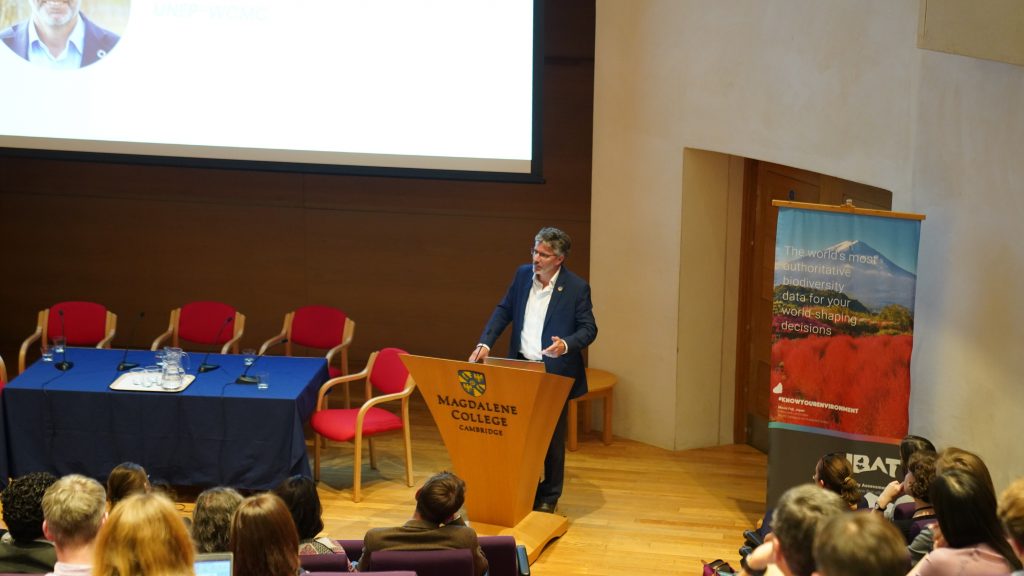News
UNEP-WCMC’s Nature Action Dialogues championed a whole-of-society approach for nature conservation

News | Jul 2024

UNEP-WCMC brought together 175 private sector stakeholders and nature experts at its first ever two-day Nature Action Dialogues event. The dialogues championed multi-sector collaboration through interactive discussions under the event’s theme “The Road to CBD COP-16: Scaling private sector action in support of global goals”.
The sessions featured a range of topics, including conversations on biodiversity credits, country-level engagement with national nature-related strategies and targets, tools and guidance for measuring impacts and dependencies, and addressing social issues in supply chains. Convened around a series of interactive discussions and workshops, attendees had numerous opportunities to exchange insights. Here are six of our key takeaways:
1. Nature is in crisis. Change requires a whole-of-society approach
Nature is in crisis. 1 million species are currently threatened with extinction. In 2023 alone, deforestation and land-use pressures resulted in 10 football pitches worth of tropical forest being lost every single minute. No one sector can address this crisis alone, a whole-of-society approach is needed to halt and reverse biodiversity loss to protect the universal right to a healthy and safe environment for all.
Global goals and targets provide all public and private sector stakeholders with actionable objectives. In this case, the Kunming-Montreal Global Biodiversity Framework (the Biodiversity Plan) was adopted as a roadmap to put nature on a pathway to recovery, with 23 urgent action targets for 2030 and four long-term goals for 2050.
The Biodiversity Plan is global, but implementation is needed at global to local scales. With 196 countries signed up to the framework, different drivers of biodiversity loss and national priorities are based on unique national and local contexts. Countries are developing their own national biodiversity strategies and action plans (NBSAPs) to set pathways for nature action. The private sector can take inspiration from this and consider NBSAPs within production regions to tailor their strategies – and contribute with them – to these national contexts. With continued collaboration across local, national and global scales, comes greater opportunity to halt and reverse biodiversity loss once and for all.
The next UN Biodiversity Conference (CBD COP-16) will take place in Cali, Colombia during October this year. This event will be the first biodiversity COP since the adoption of the Biodiversity Plan. COP-16 will take stock of progress so far in developing NBSAPs and look to their future implementation. These updated strategies will further help businesses to target their strategies to national priorities.
2. Beyond disclosure: engaging in transformative change for nature
Though it is countries who are accountable for delivery of the Biodiversity Plan, nature recovery requires transformative economic change which cannot be delivered without society-wide reform. Many targets in the Biodiversity Plan are also relevant for and dependent on action by the private sector. In particular, Target 15 encourages legal and policy action to support business and financial institutions to assess and disclose their impacts and dependencies on nature.
With a finite stock of natural capital, economic growth based on a continuously increasing use of resources is not sustainable. Transformative change in our economies and societies is required to deliver approaches that respect planetary boundaries and meet the needs of all. The private sector can spur transformative change by implementing sustainability into business models and investments from the offset, across all operations and supply chains. For example, by adopting circular economy models in which no resources go to waste.
The private sector needs support to make these transformative changes. There has been a huge wave of tools and guidance to help businesses and financial institutions shape their supply chains and investments, so they contribute towards a nature-positive world. Some examples include the Taskforce for Nature-related Financial Disclosures (TNFD), the Global Reporting Initiative (GRI) and the Science Based Targets Network (SBTN) which provides information to help stakeholders set targets and disclose their impacts and dependencies on nature. ENCORE is a tool that helps business, financial institutions and regulators to understand their potential impacts and dependencies at their core.
However, disclosure should be a step towards action, not replace it. The goals and targets of the Biodiversity Plan determine areas of opportunity for the private sector to take a supporting role in designing strategies with nature at their core. Sessions across the Nature Action Dialogues explored nature strategies in more detail. For example, Business for Nature and the World Business Council for Sustainable Development (WBSCD) led discussions on how to establish credible nature approaches within an organisation. Attendees engaged in deeper discussions on how sectors and value chains could go beyond disclosure and advance action on nature. For example, the International Union for Conservation of Nature (IUCN) and Birdlife explored how the renewables sector could manage nature impacts and contribute towards global goals. Meanwhile, the World Economic Forum and the International Council on Mining and Metals (ICMM) convened discussions on how action could be structured across metals value chains. Across these sessions, stakeholders discussed the importance of having credible data and guidance to inform their actions and approaches.
3. Business and financial institutions require data and guidance
Stakeholders can turn to a huge supply of biodiversity-related data. For example, the Integrated Biodiversity Assessment Tool (IBAT) provides users with vital information at a global scale on key biodiversity areas, protected areas and threatened species (including the Species Threat Abatement and Restoration (STAR) metric). The Aligning accounting approaches for nature (Align) project has released recommendations and criteria which support organisations to determine appropriate measurement methods. Business and financial institutions can use this information to manage risks in their supply chains or investment portfolios. However, keeping up with specific data needs is a challenge. Companies have expressed a desire for more granular data to build accurate models that can apply to existing markets. These would model the environmental impacts of production and better predict real biodiversity risks.
When companies operating in specific countries consider biodiversity risks at a landscape level, it can still be challenging to understand how to engage with global goals at an international scale. Small and medium-sized enterprises (SMEs) with fewer connections may find it even harder to know how to engage with international agreements such as the Biodiversity Plan. This indicates a need for continued collaboration between sectors, advancing a whole-of-society approach.
Businesses have expressed a need for partnerships that help them address their relationship with nature and build capacity on how to advance biodiversity management approaches. The Proteus Partnership is a longstanding cross-sector partnership that has enabled companies to access biodiversity data, tools and knowledge to address biodiversity impacts and dependencies, in line with global goals.
4. The biodiversity finance gap must be closed
There is a $700 billion annual biodiversity finance gap that needs to be filled by 2030, mainly through reforming harmful subsidies. Proper financing requires public and private sector collaboration. Governments need to take stock of harmful subsidies and re-invest this money to companies that advance nature-positive solutions. Financial institutions need to assess their portfolios to ensure green investments.
One way of investing positively is by financing nature-based solutions, a topic UNEP-WCMC explored with attendees during the event. This includes companies that are advancing “actions to protect, sustainably manage, and restore natural or modified ecosystems, that address societal challenges effectively and adaptively, simultaneously providing human well- being and biodiversity benefits”. Currently, $200 billion is invested annually in nature-based solutions and $7 trillion into nature-negative activities. This gap needs to be closed.
Rather than only invest in businesses currently advancing nature-positive activities, attendees pointed out that finance should also be directed to companies who have been responsible for deforestation, but now want to invest in change. Financial support to such companies will support a transition away from business as usual and towards sector-wide progress for biodiversity.
Discussions highlighted the tendency to focus on climate finance, with biodiversity needs and benefits taking a backseat. More support is needed to provide private sector stakeholders with knowledge of links between the climate and biodiversity crises. For example, in understanding how nature-based solutions that champion healthy ecosystems help address climate mitigation and adaptation.
5. Social considerations must be integral to nature strategies
Although most global financial centres and large companies operate from outside of biodiversity hotspots, these biodiversity hotspots tend to be the major production sites for goods, from agricultural goods like soy to natural resources like cobalt. This can make it challenging for companies to understand on-the-ground social and environmental risks, especially when it comes to the perspectives of Indigenous Peoples and local communities involved in or close to production sites. Relevant international organisations and non-governmental organisations can step in to advise companies on how to engage with vulnerable communities in a just and meaningful way.
Human rights must be integrated into nature strategies from the offset, not retrofitted. Companies tend to focus on compliance with human rights legislation rather than actively plan ways to advance rights. This is due to a general lack of expertise on the issue. During the dialogues, there was an appetite for increased collaboration with legal experts to better understand how to proactively support human rights at all levels of supply chains.
6. Barriers can be overcome through multi-sector collaboration
Collaboration can overcome many of these challenges. Though private sector stakeholders may not have all the answers, they are increasingly engaged in meaningful action for nature. Stakeholders expressed a desire for continued collaboration with social and biodiversity experts to fill knowledge gaps on interpreting data and integrating rights-based approaches.
International organisations such as UNEP-WCMC can support the private sector by considering how the goals and targets of the Biodiversity Plan relate to business and finance, and identifying opportunities across sectors to engage in their implementation. Outcomes from COP-16 will provide further guidance on what this engagement should look like. As they take stock of their planning processes to date, countries will better understand how to focus on national and local implementation.
The Nature Action Dialogues will run again in March 2025
This year’s Nature Action Dialogues have been a great success. Conversations across the two days have resulted in a re-invigorated desire to strengthen multi-sector collaborations to meet global goals for nature. To continue these action-based discussions, UNEP-WCMC will be hosting another Nature Action Dialogues event in Cambridge during March 2025.
If you are interested in attending next year’s event, please register your interest using this form.
Main image: RooM the Agency, AdobeStock.
Have a query?
Contact us
communications@unep-wcmc.org
